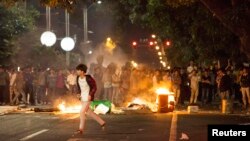Protests against a proposed petrochemical plant in southern China spread to the provincial capital Tuesday, even as authorities signaled they may back down on construction plans in attempt to head off more unrest.
Demonstrators in Guangzhou renewed calls for an end to the chemical plant project and justice for those who they believe were hurt or killed at the hands of paramilitary police two days earlier.
Sunday's protest began when hundreds of residents in Maoming - a city in Guangdong province - staged a sit-in against a proposal to build a factory producing paraxylene, a chemical used in making fabric and plastic bottles. Such plants have become a hot-button issue around China because of health concerns.
Photos and videos posted on social media sites showed police with batons chasing people, men in a hospital with cuts to their heads, people smashing streetlights and an overturned car.
The city government said in a statement Monday that police acted "quickly and decisively" to take control of the situation - a claim that protesters disputed. Police said no one died, but they gave no estimate of injuries.
Pan,a Maoming native who works in Guangzhou, spoke to VOA over his mobile phone from a Guangzhou police station where he was waiting to be questioned.
“We feel very disappointed in the way they are handling this," said Pan. "On this type of matter information should not be blocked. We all should have the right to know.”
Police later confiscated Pan's cellphone.
The Maoming government said in a statement posted online late Tuesday that no timeline had not been set for the petrochemical plant project, and noted it is still far from being approved.
"We reiterate that this project is still under scientific study, and until the public has reached a full consensus it will not start," the statement said. The city had previously called the protests a "grave violation" by criminals causing chaos.
Wang Aizhong, a human-rights activist working in Guangzhou, said government assurances lack credibility:
“Currently the Chinese people do not really believe the government’s rhetoric," said Wang. "This is one side of the problem. For the people, the government has a credibility problem.”
Residents demonstrating against paraxylene projects have been encouraged by other recent protests in recent years that persuaded local authorities to either postpone construction plans or seek further public consultation.
Choking smog blankets many Chinese cities, and the environmental consequences of the country's breakneck economic growth have angered many local residents.
Demonstrators in Guangzhou renewed calls for an end to the chemical plant project and justice for those who they believe were hurt or killed at the hands of paramilitary police two days earlier.
Sunday's protest began when hundreds of residents in Maoming - a city in Guangdong province - staged a sit-in against a proposal to build a factory producing paraxylene, a chemical used in making fabric and plastic bottles. Such plants have become a hot-button issue around China because of health concerns.
Photos and videos posted on social media sites showed police with batons chasing people, men in a hospital with cuts to their heads, people smashing streetlights and an overturned car.
The city government said in a statement Monday that police acted "quickly and decisively" to take control of the situation - a claim that protesters disputed. Police said no one died, but they gave no estimate of injuries.
Pan,a Maoming native who works in Guangzhou, spoke to VOA over his mobile phone from a Guangzhou police station where he was waiting to be questioned.
“We feel very disappointed in the way they are handling this," said Pan. "On this type of matter information should not be blocked. We all should have the right to know.”
Police later confiscated Pan's cellphone.
The Maoming government said in a statement posted online late Tuesday that no timeline had not been set for the petrochemical plant project, and noted it is still far from being approved.
"We reiterate that this project is still under scientific study, and until the public has reached a full consensus it will not start," the statement said. The city had previously called the protests a "grave violation" by criminals causing chaos.
Wang Aizhong, a human-rights activist working in Guangzhou, said government assurances lack credibility:
“Currently the Chinese people do not really believe the government’s rhetoric," said Wang. "This is one side of the problem. For the people, the government has a credibility problem.”
Residents demonstrating against paraxylene projects have been encouraged by other recent protests in recent years that persuaded local authorities to either postpone construction plans or seek further public consultation.
Choking smog blankets many Chinese cities, and the environmental consequences of the country's breakneck economic growth have angered many local residents.





